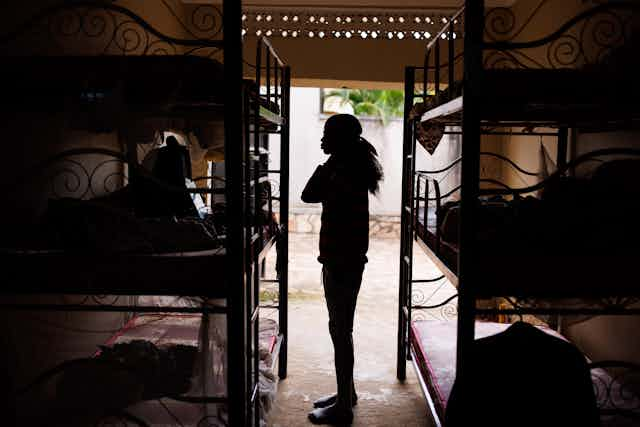Ending the AIDS pandemic – particularly in eastern and southern Africa – cannot be achieved unless more resources are channelled to meet the needs of key vulnerable populations.
This is one of the themes that emerged during an AIDS conference in June in South Africa. Prejudice against particular groups – such as men who have sex with men (MSM) and transgender communities – interferes with treatment regimes and people’s adherence to treatment. These groups are also at higher risk from HIV due to increased levels of stigma, discrimination, violence and criminalisation.
Our research is part of a three-year project on HIV-related stigma linked to young people with sexual or gender diversity. The research, conducted in Malawi, Zimbabwe and Zambia, involved 156 participants.
The research identified three main findings:
Criminal laws and strongly negative socio-cultural and religious beliefs produced deeply rooted intolerance around sexual or gender diversity.
Participants spoke about repeated experiences of verbal harassment, being gossiped about and physical violence.
Other population groups with HIV said their lives had become more tolerable as social awareness and acceptance of HIV had increased over time. However HIV-related stigma regained its potency when linked to sexual or gender diversity, with adverse effects for adherence to antiretroviral treatment.
Our research provided novel evidence on the deeply rooted fears and anxieties around multiple forms of stigma among young MSM and transgender women in southern Africa.
Criminalising sex
Across 13 countries in east and southern Africa, laws and policies criminalise same-sex sexual relations and facilitate the process of stigmatising gay and transgender individuals.
Recently, Uganda passed the Anti-Homosexuality Act of 2023, which punishes same-sex conduct with life imprisonment. Several acts considered as “aggravated homosexuality” are liable to the death penalty.
Our study also noted that young people had developed various strategies to manage their lives. For example choosing when to disclose or identify as a person living with HIV or as a member of the sexual minority community in others, but rarely being both at once.
The constant worry and stress of living with HIV, and the fear of being stigmatised, could have a significant impact on health and wellbeing.
The burden of concealing their identities resulted in a range of mental, emotional and physical vulnerabilities. Signs of depression as well as frequent alcohol use were evident.
Overall 42% of participants had contemplated suicide at least once. According to one participant, an 18-year-old:
I feel like I am nothing, I am useless. In the community, looking at HIV, I am a gay, people they isolate me. So, I don’t feel comfortable, even failing to go to work and finding some money, whatever. And, sometimes, I decide if I can die today, I can rest. So, a lot of things come into my mind when I am disturbed … Sometimes my parents try to comfort me but, internally, I am really disturbed.
As well as signs of depression, frequent alcohol use was evident.
There were few services available to assist in coping with these multiple stigmas, with those that came closest being provided by “sexual minority friendly” organisations or led by sexual minority peers themselves.
Fear of being found out
Being seen taking antiretroviral therapy or having it found in one’s possession signalled that one was living with HIV. Some individuals preferred to miss doses, occasionally or over more prolonged periods, rather than endure actual or feared stigma linked to being “found out” as someone living with HIV.
A 24-year-old told us:
What made me to delay taking medication is when my partner wants me to visit his home because he stays in Zomba, and I haven’t disclosed my HIV status to my partner yet, and I can’t take the ARVs with me there. As a result, I go there without the ARVs.
A 19-year-old said:
It affects me sometimes because, if people reject you, you feel like stopping to take the medication. ‘Maybe am just wasting my time, let me just die.’ It affects me a lot.
Other findings we made were that:
Many participants had had their status disclosed by LGBTIQ+ peers without their consent. HIV-related stigma is still highly prevalent within the LGBTIQ+ community and has many negative impacts.
Participants continued to experience or fear stigma related to their sexual orientation at health facilities, which also affected their access to healthcare and retention in care.
Tailored HIV services for key populations, including young MSM and transgender women, were not reaching everyone; rural areas were the least included.
Through their experiences, gay young men and transgender women were familiar with the harmful consequences of stigma and yet they were often ostracised from planning and decision-making roles.
The way forward
Key populations in our study faced inequalities in three main areas: access to HIV services; justice and human rights; and investments in programmes geared towards them.
There were few services available to assist in coping with these multiple stigmas. Those that came closest were provided by “sexual minority friendly” organisations or led by sexual minority peers themselves.
There need to be more community-based organisations that are run by members of these key populations. In Cameroon, for example, the CHAMP programme supports grassroots advocacy to mitigate stigma and violence and trains peers to offer counselling,
We can only achieve progress if we treat everyone as equal partners in fighting this pandemic.

